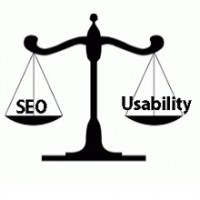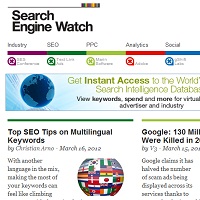Post contributed by Beth Cooper, on behalf of DesignContest.com, a crowd sourcing company using Logo Design Contests to supply unique and affordable designs.
If you’re looking for ways to spread the word about your website or you’re trying to make money online as an Internet marketer, you may benefit greatly from SEO (or, search engine optimization) techniques.
What is SEO?
SEO refers to a series of strategies that can lead to a high ranking for your website in search engines, such as Google, Yahoo! and Bing. The goal is that people find your site among the top results when they use search terms that are relevant to your site. You can pay a reputable SEO company to manage the marketing and optimization of your site for you, or you can learn about SEO through various Internet marketing websites and books and implement the strategies yourself.

Important SEO Terms You Should Know
If you want to embark on the journey of improving your web presence, here are some of the SEO-related terms and concepts you should understand:
Backlinks – URL links that website owners try to build online in order to point “back” to their websites. You can get backlinks, for example, by writing high-quality articles with a link to your site at the end, or by posting links to your site on popular social bookmarking services like Digg or Delicious.
Backlinks are used to serve one or both of the following purposes: 1) to increase the visibility of a website online and attract human “traffic” to the site, and 2) to increase a website’s clout within search engines and help improve site rankings. The highest-quality backlinks–that is, the ones that are most likely to ensure your site ranks highly in search results–are those that appear on popular sites and blogs that are related in subject matter to your site.
Blog – Short for “weblog,” a running journal that you can use to add fresh content to your site. The most successful bloggers write informative posts on a regular basis and build loyal readerships. Blogging is a great way to add a constant stream of fresh information to your site (which helps search rankings) and engage your visitors.
Keywords – The words or phrases a person uses in a search engine to find the information he or she is interested in on the web. SEO entails “optimizing” a website for the keywords that are relevant to the site. You can achieve this by using a keyword a few times within the text of a webpage in a way that makes sense. This helps the search engines “see” a website as being relevant to that keyword. As a result, when someone uses the keyword in a search engine, he or she will ideally find your site among the top results.
Keyword Density – The percentage of keywords appearing within a piece of text. Many SEO experts advise a keyword density between 3-4% for articles and blog posts, whereas others suggest that keywords should be used sparsely and only when they can be naturally “hidden” in context.
Keyword Research – The process of finding popularly-used keywords to optimize webpages, articles, and blog posts for. Keyword research is often done by using online software applications such as the Google External Keyword Tool.
Off-Site Optimization – SEO methods used “outside” of a website. Off-site optimization primarily involves building backlinks (for example, by writing guest posts on popular blogs or using social bookmarking services to promote your site) and exposing a site to as many people as possible.
On-Site (or On-Page) Optimization – SEO methods used “within” a website. This includes optimizing a certain webpage for specific keywords and keeping your site design aesthetically pleasing and error-free.
Organic Search Results – A listing of websites that is returned due to the specific keywords that the searcher types into a given search engine. Organic search results do not include websites which appear in paid advertisements.
Pay-Per-Click – A method that some website owners use to advertise their websites in search engines and other relevant sites. Using pay-per-click ads entails that the site owner pays a small amount each time someone clicks on the ad.
ROI – Short for “return on investment.” The term refers to the amount of money gained as a result of an investment, and can be calculated by 1) subtracting the cost of an investment from the gain and 2) dividing the result by the cost of the investment. Website owners who pay for various SEO services can use the ROI calculation to determine where their money is best spent.
Search Algorithm – The “secret formula” a search engine uses to determine which websites should be returned, and in what order, for a given search term. Algorithms take a number of factors into account for site rankings, such as keyword optimization (which signals the relevance of a site to certain search terms), whether or not the site is regularly updated, the number and quality of backlinks a site has, the length of time visitors spend on a site, how quickly the site loads in a web browser, and whether or not a site is actively being shared in popular social media outlets such as Facebook and Twitter.
SERPs – An acronym standing for “search engine result pages.” The goal of SEO techniques is for a website to be listed as high in the SERPs as possible for given keyword search terms, preferably on the first page and in the first position.
Traffic – The human beings who visit your website. The most responsive traffic is “targeted” traffic, meaning that the people most likely to enjoy, return to, and recommend your site (and make you money, if you’re selling products or displaying advertisements) are those who are particularly interested in the site’s subject matter. Effective SEO strategies will help drive as much organic, targeted traffic to a website as possible.
White-hat SEO – SEO methods that are thought of as conscientious, ethical, and reliable Internet marketing practices. These include article syndication, guest blogging, and social media marketing. White-hat SEO is often distinguished from black-hat SEO, which involves frowned-upon practices that attempt to “trick” search engines into ranking sites highly (such as “stuffing” webpages with popular keywords or using special software to distribute “spammy” blog comments all over the web solely for the purpose of backlinks).
All in all, search engine optimization comprises a number of strategies that, if smartly used without sacrificing content quality, can increase a website’s prominence and popularity. Whether you pay for SEO services or you learn to implement the techniques yourself, solid SEO practices will gain you more traffic, make you more money, and breathe new life into your web presence.







